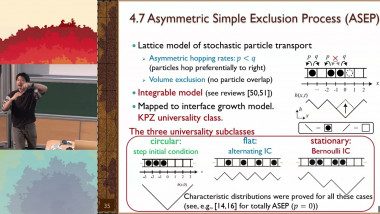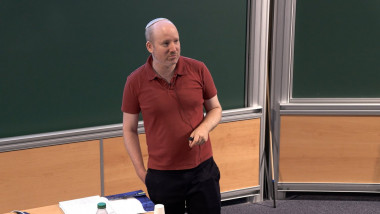
Introduction to the Physics of the KPZ Universality Class (3/3)
By Kazumasa Takeuchi

Lecture 3: What is the Universal Scaling Limit of Random Interface Growth, and What Does It Tell Us?
By Ivan Corwin
Appears in collection : 2025 IHES Summer School – Statistical Aspects of Nonlinear Physics
The Kardar-Parisi-Zhang (KPZ) class is a prominent universality class known to describe a surprising variety of models and phenomena, including growing interfaces, directed polymers in random media, stochastic particle transport, and most recently even quantum systems such as the exciton-polariton condensate and integrable spin chains. Remarkably, the 1D KPZ class is exactly solvable in many aspects, opening a window to detailed statistical properties through its links to various mathematical problems. The lecture will include a pedagogical introduction to basic properties of the KPZ equation, an illustrative outline of characteristic distribution and correlation properties revealed by exact solutions, and a survey of experimental studies on growing interfaces. 1. Introduction: why should we care this? 2. Scaling exponents and universality classes 3. Basic properties of the KPZ equation 4. Distribution and correlation properties: stationary & non-stationary cases 5. Experimental test of predictions from integrable models 6. Distribution properties for general cases and variational formula Main reference: K. A. Takeuchi, "An appetizer to modern developments on the Kardar-Parisi-Zhang universality class", Physica A 504, 77-105 (2018).
